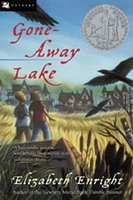
Sometime last fall, a college student preparing for a trivia contest contacted me to ask if I could help him identify what he believed to be a children's book illustration that was included in a contest preparation packet he had recieved. Of course, I couldn't, so I contacted the folks at the child_lit listserv. Some people there recognized it immediately as the scene where Portia and Julian meet Aunt Minnehaha in a Newbery Honor Book from 1957.
And that is how I learned of Gone-Away Lake by Elizabeth Enright.
Gone-Away Lake is the story of how two cousins, Portia and Julian, learn of the existence of an abandoned summer colony on what was once a beautiful lake but has now become a swamp. Living in two of the deteriorating houses are an elderly man and woman, a brother and sister who had lived at the colony in the summers back at the end of the nineteenth century with their wealthy family. Portia and Julian spend their summer hanging out with their new friends, Aunt Minnehaha and Uncle Pindar, and learning what life was like back in the day for that class of people who used the word "summer" as a verb.
That's it. That's about all that happens. Aunt Minnehaha and Uncle Pindar aren't ghosts or child molesters or criminals hiding out or victims of land developers. Julian and Portia aren't escaping from monster parents. Aunt Minnehaha and Uncle Pindar don't teach the kids any big life lessons about death or aging.
There's nothing here that will provide a big, climactic scene or even much of a plot. Gone-Away Lake is just a lovely, elegant, atmospheric story about a really good summer.
Back in the 1950s it probably gave child readers a window into an earlier, more elegant time. What I find interesting about the book is that now, after all these years, it gives us a window into the 1950s.
After reading Gone-Away Lake, I envision the 1950s as a time when young boys dressed up in flannel suits to travel by train. Their older sisters wore hats while traveling. Boys (but not girls) carried "killing jars" so they could off the various bugs they collected. (There's something you don't see often in kids' books these days.) My gut twisted up into knots when the kids decided they would keep Gone-Away a secret from Julian's parents because it was fun to have something just for themselves. But keeping secrets from your parents doesn't appear to have been dangerous back then. Nor was it dangerous to enter a stranger's ramshackle house. And nobody thought twice about elderly people squatting in abandoned houses because they didn't have the money to live anywhere else.
It was a different time. Not a better time. Not a worse time. Just different.
Aunt Minnehaha and Uncle Pindar, stepping out of the past and talking about their childhood, are characters who work just as they did in the 1950s because they were from a different time even then. The contemporary elements of the story, though, are dated in a quaint, intriguing way.
I've written a number of what I call my "suburban books"--stories rooted in the lives of 1990s and our turn-of-the-century children. Fifty years after their publication, they should be dated just as Gone-Away Lake is. I just hope that in 2048, someone wandering the stacks in the children's room of a library stumbles upon a copy of, say, A Year with Butch and Spike the way I stumbled upon Gone-Away Lake a few weeks ago.
I can accept being dated. I just want to still be around.
3 comments:
I LOVE Elizabeth Enright's books.
I'm aware that she wrote some books about a family called the Melendys. I've seen references to those books over the years, though I've never read them.
I found that book by accident and brought it on a beach trip as a bedtime story for my son. Still have wonderful memories of reading it together at night with the ocean in the background. I'm glad you discovered that gem, and here's wishing fathers and sons will enjoy reading your books together in 50 years. I have no doubt they will!
Post a Comment